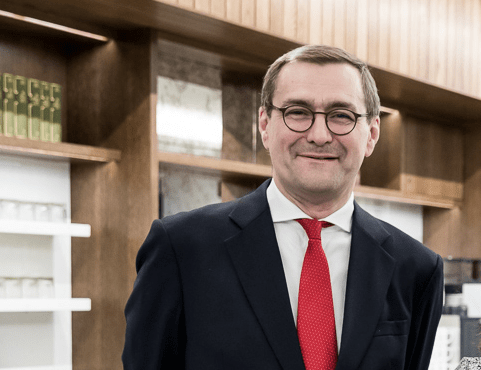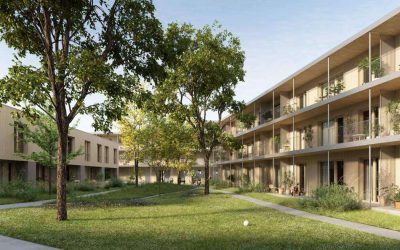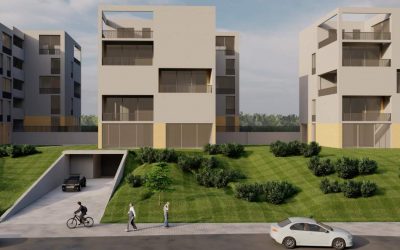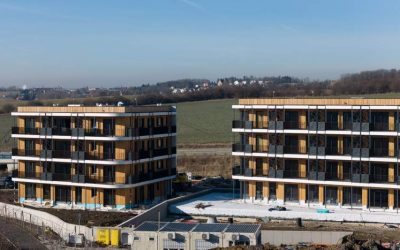 In early October, Petr Urbánek was named director of the Prague Development Company (PDS), a brand-new, publicly-funded entity whose establishment marks a fresh effort by the city to add to its limited stock of public housing. It’s been clear for years now that prices for flats in the Czech capital were rising beyond the budgets of the middle class. That’s not just a problem for the private developers who are running out of people to sell to: the resulting lack of diversity is becoming a threat to the functioning of the city itself, since essential workers (including nurses, emergency service professionals or teachers) don’t tend to be paid very well.
In early October, Petr Urbánek was named director of the Prague Development Company (PDS), a brand-new, publicly-funded entity whose establishment marks a fresh effort by the city to add to its limited stock of public housing. It’s been clear for years now that prices for flats in the Czech capital were rising beyond the budgets of the middle class. That’s not just a problem for the private developers who are running out of people to sell to: the resulting lack of diversity is becoming a threat to the functioning of the city itself, since essential workers (including nurses, emergency service professionals or teachers) don’t tend to be paid very well.
That’s why most European cities have built up stocks of public housing or at least rent-controlled apartments, but they’ve done this over a period of decades. Not Prague, though. The city sold off most of its residential assets in wave after wave of privatizations beginning in the 1990’s in the rush to embrace what it saw as a market economy. This may have had substantial benefits for thousands of families, but it leaves the city itself with few options to provide help where it’s needed.
But there’s a deeper issue at stake that lies behind the creation of PDS, because deciding to build affordable rental flats is the easy part. The bigger problem is conceptual: where do you build them, on what, and for how much? It’s not just that the city didn’t know the answers until recently. It didn’t even know what its options were. Because for years now, the city has had only the most superficial information of its own land holdings. There’s documentation about the number and size of all of its parcels, of course. But there’s never been a single office or person in charge of analyzing it all and treating it as a single portfolio. Until just recently, the city had no realistic understanding of the value of its holdings and no methodology for assessing it. And with literally thousands of plots and hectares of land involved, there are vast sums of money potentially at risk of being lost, mismanaged or wasted.
“Despite a few minor attempts, for whatever reason, no political representation had been willing to bring consciousness into the city’s real estate activities,” says Urbánek . “It’s not a criticism. Real estate development is a multidisciplinary realm and [knowledge about the land] was all just “atomized” into several administrative departments and they don’t always have such a clear focus on real estate knowledge integration.
Deputy mayor Petr Hlavaček, his advisor Martin Červinka together with the IPR team coordinated by Urbánek spent the last year (before the official founding of PDS) going through the city’s huge portfolio of land holdings for the purpose of identifying around a dozen potential development locations. The Novodvorska zone in Prague 4 is typical of the opportunities Prague has been missing out on. Urbánek explains how they realized with growing amazement over a period of days just how much land the city controlled in the area. They quickly saw that by incorporating several parcels into a unified development strategy, a project of tremendous value could be created on an area of around 22 hectares. Additionally, it turned out that the existing regulations (the built-up coefficient) allowed for just 140,000 sqm of new residential and services space to be built. But those building guidelines fail to reflect the fact that a new station along the metro’s new D line will be built adjacent to the site. This means the total volume of new real estate could grow to nearly 300,000 sqm.
That’s a dramatic looking increase in potential construction, but it’s only logical. “Why should you have low density construction next to a metro station?” Urbánek asks. He points out that the city is set to spend CZK 75 billion to build the new metro line. The more density that can be built along the line, and especially around the new stations, the more efficient that investment will be from an urban planning standpoint. Having “assembled” the land, he says, “we can actually integrate the know-how, the technical, and economic aspects and combine them all at a relatively small cost for the city. And I would say the increase of the value will be tremendous.”
For the sake of clarity, Prague Development Company is currently not expected to bring this entire project to completion. For the moment in fact, the question of who will actually end up building projects is literally the last of Urbánek ‘s worries. A variety of solutions are under consideration, including city-led investments, bringing back cooperatives, or whether the German system of ‘baugruppe’ would be appropriate in the Prague environment. Selling the land off to private developers, however, is not seen as the prevailing option. Urbánek ‘s primary task for now is assembling plots, handling the zoning, creating a design brief for the future flats and then securing planning and building permits.






